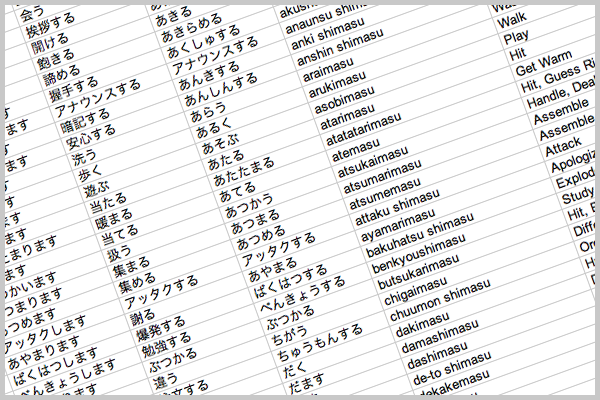The “Ultimate” Vocab Lists
“Not everything that can be counted counts, and not everything that counts can be counted.” - Albert Einstein

At this point, I’d like to introduce the “Ultimate Verbs List.” This is the first of three “Ultimate” lists you’ll run into this season, and they’re called “ultimate” for a reason.
Your first list is just for verbs and the other two lists will cover nouns and adjectives. You’ve learned the really common verbs and adjectives (and some common nouns, though those are harder to gauge when it comes to how common they are), but now it’s time to take it to a new level. It’s no secret that vocabulary is ridiculously important for communication – if you don’t know vocab, then you aren’t going to be able to say what you want to say, no matter how much grammar you know. Grammar’s important too, for sure, but you need them both to get good at Japanese.
Now, these “Ultimate” lists are fairly long (250+ words to learn), but they weren’t sloppily thrown together. There’s a lot of rhyme to their reason, and if you learn them, you’ll be way ahead of everyone else.
Take the verbs list, for example. In order to make it, I took 1000 verbs, and cut them down to 260 verbs. These 260 verbs are the verbs I thought would be most useful for you. They are going to be the most common, most usable verbs. Sure, there are verbs from that 1000 you may run into or may want to use, but 95% of the time these 260 will be just what you need (feel free to spend four times the amount of time to learn that last five percent, but sure seems like a waste of time to me, at least for where you’re at right now).
Anyways, that’s the goal for these “Ultimate” lists. With verbs and adjectives, it’ll be easy to cut the list down to around 250 good words for you to know. With nouns (since there are so many more of them) I’ll be pulling them out from “most commonly used words” lists so that you’re learning the most common nouns as well (though of course you can’t only learn 250 nouns – you must continually learn new nouns).
There’s going to be a lot of vocabulary to learn, sure – but at least you can feel good knowing that the vocab you’ll be learning from these “Ultimate” lists are the most common words out there. It makes sense to learn the words that show up the most first, and then work your way down to less and less common vocab. That way, you’re getting a lot more bang for your buck per new vocabulary word that you learn. It has to be about efficiency.
On that note, you’ll need to learn how to use the new vocab lists (or more specifically the Verbs one, at least right now). Since they’re longer and more complicated, you’ll have to use a few fancy tricks that Anki has to make your vocab learning time even more productive.
